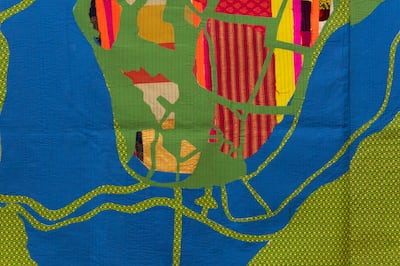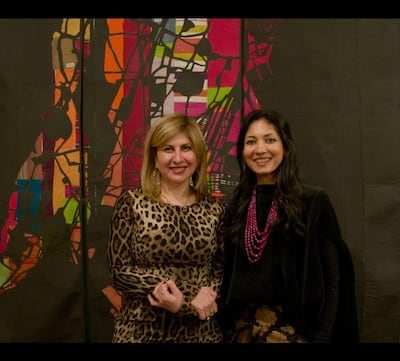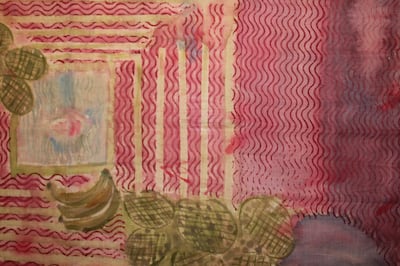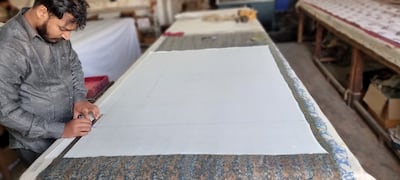
A new virtual gallery, Iterarte, allows access to artists from countries from the Mediterranean to South Asia, a region that has historically been linked by empires and trade routes.
“There is an exchange over the millennia – it’s the world of antiquity, the Silk Roads, and rather diasporas and migration,” says Tamara Chalabi, an Iraqi author and veteran art supporter who founded Iterarte with Indian entrepreneur Shilpa Sharma.
Iterarte is organized as both a magazine—with features, podcasts, videos, and even artist-curated playlists—as well as a sales gallery selling (and delivering) art to online buyers. The couple currently works with 18 artists, but not with exclusive representation. Rather, they will sell works that have been submitted to Iterarte and commission new projects in a section called Variations, in which artists present existing works in different mediums.
The platform launched last week with an exhibition of works by New Delhi-based artist Nidhi Khurana, in a former carriage house in London’s posh Mayfair area. This is one of a number of exhibitions that the two plan to organize in different locations.

The performance Traces of Existence: Place Between Places is an appropriate choice to start the project. Khurana is inspired by maps, which she renders in vivid quilted textiles on plate and metal, in a handcrafted work that prompts the artist to sift through memories.
The process reflects dual goals for Iterarte, as the platform reaches across the region to find connections and shared models of work – and hopefully new artists and collectors.
“The art world can sometimes be a closed loop,” Chalabi says. “Many of the same artists participate in different biennales. This makes it very difficult for regional artists to break through, especially those from art scenes that are closed for economic or political reasons. Name one internationally famous Iraqi artist who actually lives in Iraq. The same is probably true of many other places.”
Chalabi started the Ruya Foundation in 2012, which has long been a rare source of financial support and independent exhibition space for artists in Baghdad. Later, with Ruya Maps, she looked to other countries whose cultural scenes were facing the effects of conflict. As Ruia continues, Chalabi is also keen to expand the international profile of the artists she has worked with through these projects.
The search for new collectors also involves democratizing the process, they argue.
“There are a lot of people who want to buy art but don’t know how,” says Sharma. “The access isn’t there for artists — and sometimes it’s not there for collectors either.”

In this, Iterarte joins a number of online ventures that have emerged in recent years – all promising price transparency and openness in an attempt to combat the barrier to entry often perceived in mainstream galleries. These platforms have been supported by the fact that an increasing share of art is now sold online, especially since the pandemic. According to the latest Art Basel and UBS sales report, online buying now accounts for 18 percent of art sales, nearly double the pre-pandemic level.
Artsy, which launched in 2012, virtually hosts the works of more than 100,000 artists; smaller outfits like Artmother, which was launched by the former Flash Art editor Michael Polsinelli, have since followed suit.
They all use editorial programming as a way to attract readers and allow prospective collectors to gain insight into artists’ practices. If a long-standing critic of art magazines such as Freeze and Artforum was that they were just ads for galleries. These ventures cut out the middleman – read the article, buy the job.
But they also seek to work in new ways in the art space. Artsy holds an online fair and commissions art market research. Iterarte, which has a larger curatorial mission, seeks to collaborate directly with artists and support the region by commissioning content in texts, podcasts and video. Editorial coverage, directed by Laura Egerton, will not be limited to the artists Iterate sells.
Iterarte’s most interesting direction, Variations, works directly with artists to help them realize an existing work in another medium – a painting that can be depicted in embroidery, or a collage in mosaics.

The choice of medium will depend on the artist that Iterarte supports, pairing them with artisans and craftspeople with whom they have existing relationships. They hope this will have the added effect of supporting potentially endangered craft practices.
Greek artist Lydia Delicoura chose to depict her painting The banana falls very, very far from the tree (2022) in block printing, collaborating with artisans from Jaipur.
Artisans created woodblocks based on the repeating motifs of her painting, dividing her composition into layers that they printed one after the other, working by hand on cotton fabric.

The variations also highlight the shared cultural traditions of Iterarte’s geographic range. Craft practices and idioms cross the area; with Variations, the pair tests what mastery can add to contemporary work when artists are given the chance to explore beyond their national or even technical boundaries.
“We’re trying to think laterally, horizontally,” Chalabi says. “The way a word would appear in the Mediterranean, in subtle changes in Arabic, Persian, Turkish, Greek – we want to do this for art.”
“We want to remove regionalism from the region,” says Sharma.
Updated: March 26, 2024, 4:28 am